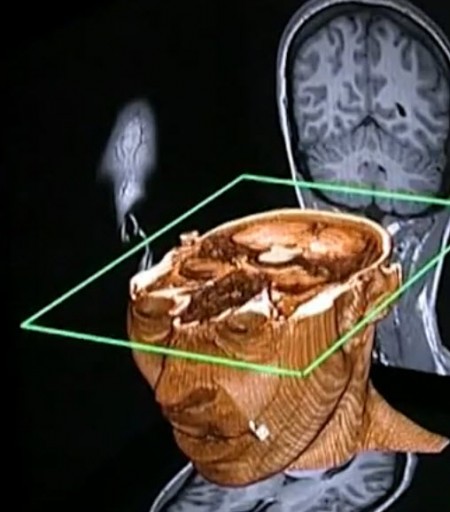How your memories can be twisted under social pressure
July 4, 2011 by Amara D. Angelica

Is your amygdala lying to your hippocampus? (Credit: Weizmann Institute)
Listen up, Facebook and Twitter groupies: how easily can social pressure affect your memory?
Very easily, researchers at the Weizmann Institute and University College London have proved, and they think they even know what part of the brain is responsible.
The participants conformed to the group on these “planted” responses, giving incorrect answers nearly 70% of the time.
Volunteers watched a documentary film in small groups. Three days later, they returned to the lab individually to take a memory test, answering questions about the film. They were also asked how confident they were in their answers.
They were later invited back to the lab to retake the test. This time, the subjects were also given supposed answers of the others in their film-viewing group (along with social-media-style photos) while being scanned in a functional MRI (fMRI) that revealed their brain activity.
Is most of what you know false?
Planted among these were false answers to questions the volunteers had previously answered correctly and confidently. The participants conformed to the group on these “planted” responses, giving incorrect answers nearly 70% of the time.
To determine if their memory of the film had actually undergone a change, the researchers invited the subjects back to the lab later to take the memory test once again, telling them that the answers they had previously been fed were not those of their fellow film watchers, but random computer generations.
Some of the responses reverted back to the original, correct ones, but get this: despite finding out the scientists messed with their minds, close to half of their responses remained erroneous, implying that the subjects were relying on false memories implanted in the earlier session.
An analysis of the fMRI data showed a strong co-activation and connectivity between two brain areas: the hippocampus and the amygdala. Social reinforcement could act on the amygdala to persuade our brains to replace a strong memory with a false one, the researchers suggest.
Ref.: Yadin Dudai, et al., Following the Crowd: Brain Substrates of Long-Term Memory Conformity. Science, 2011; 333 (6038): 108-111 [DOI: 10.1126/science.1203557]